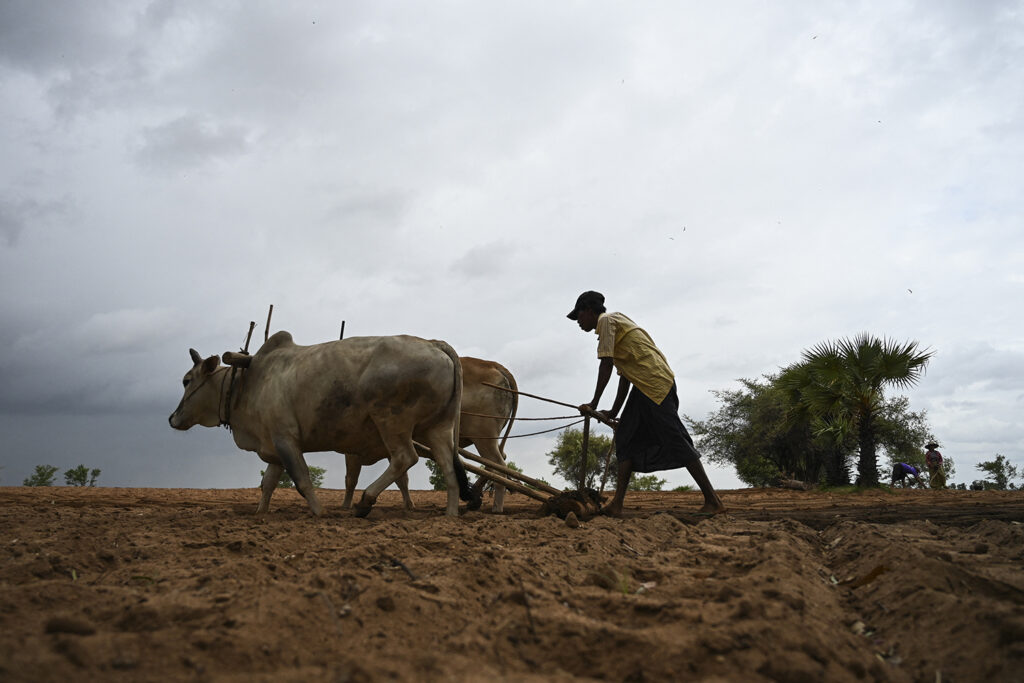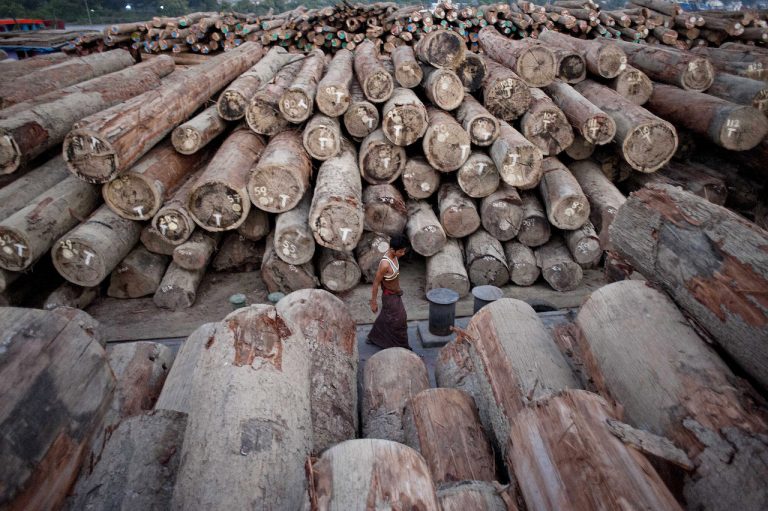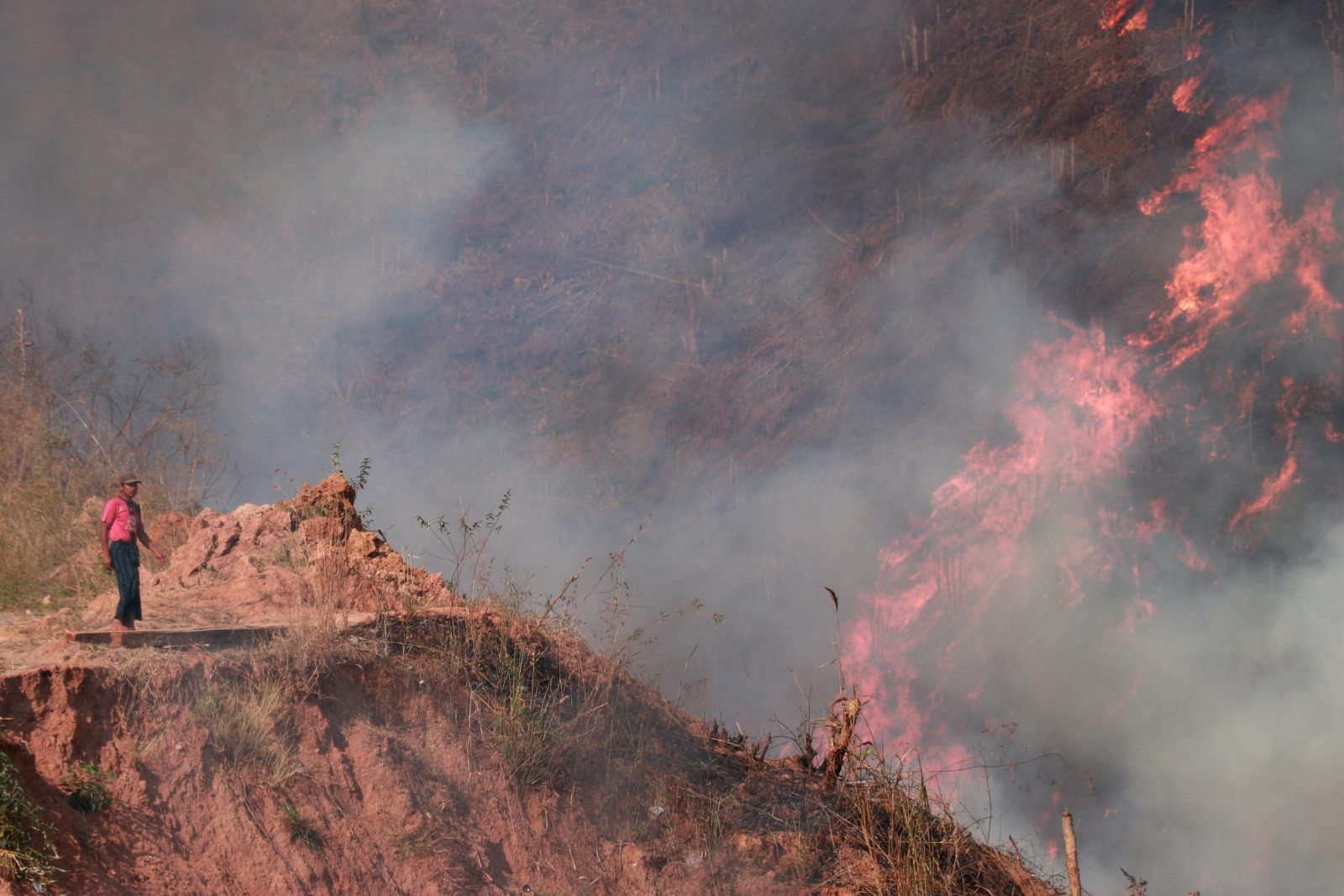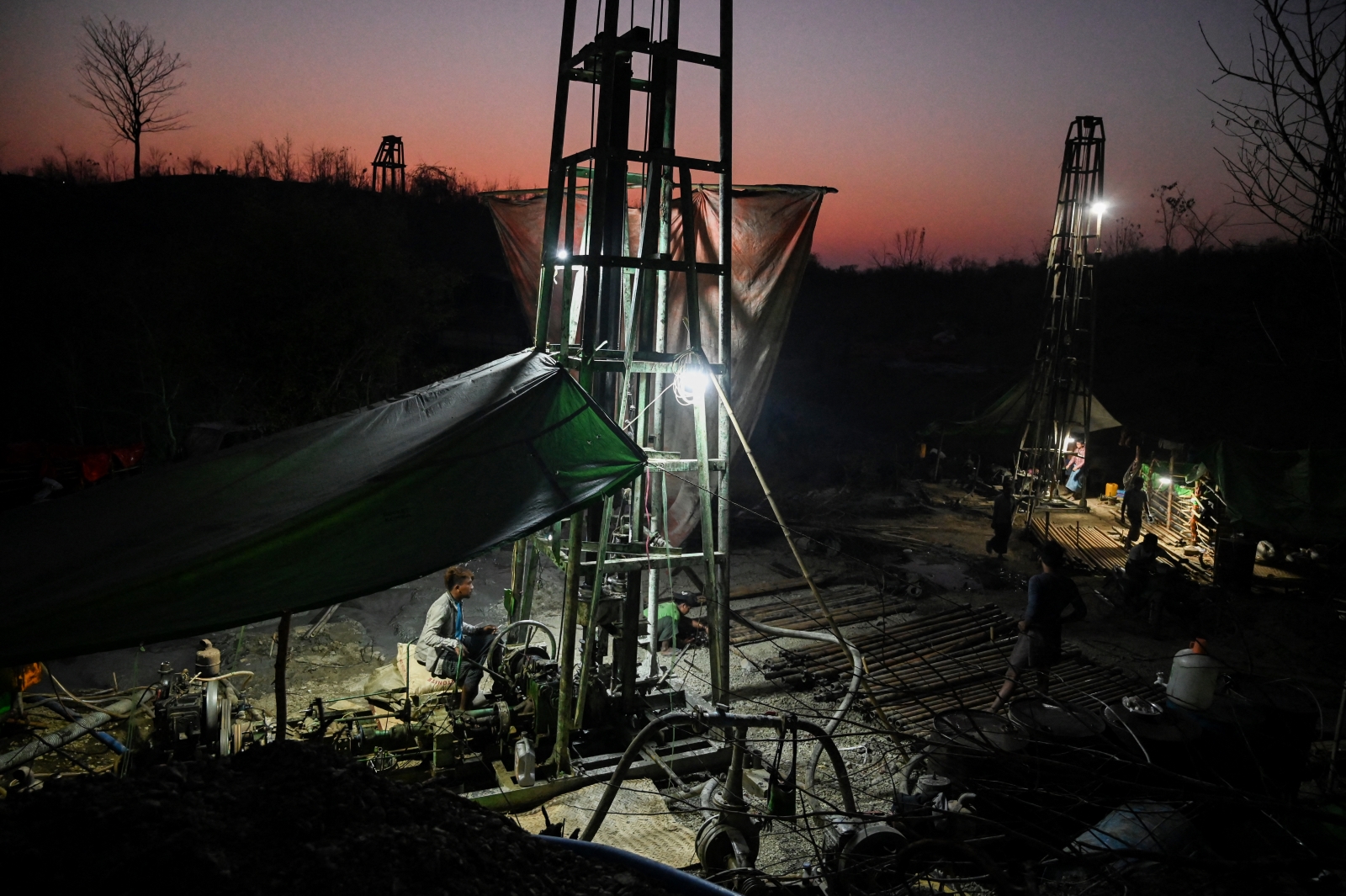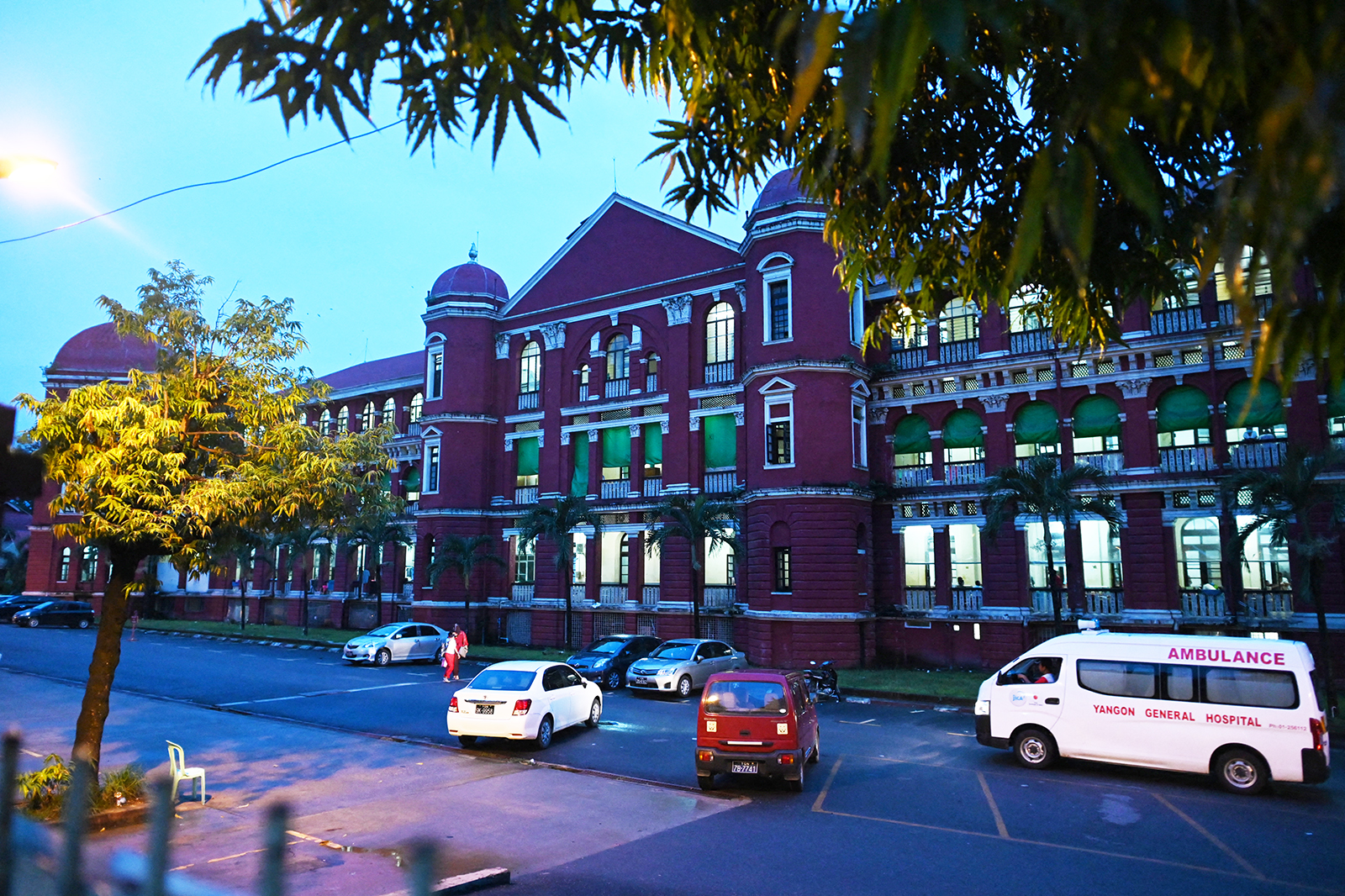Amid signs of crisis at the Myanma Agricultural Development Bank, farmers behind on loan repayments have been threatened with land seizures, while bank staff are being squeezed by both the regime and the resistance.
By FRONTIER
U Phoe Tote prepares his rice fields for planting under a steady monsoon rain. Despite the serenity of the delta scenery, he is filled with anxiety about his finances.
Earlier this year, the 53-year-old had to borrow K2 million (nearly US$1,000) at high interest rates from an informal lender in his village in Ayeyarwady Region’s Danubyu Township so he could repay a loan from the Myanma Agricultural Development Bank.
The bank has traditionally been a lifeline for millions of rice farmers, who take out low-interest loans for both the rainy season crop, harvested in August or September, and the winter crop, harvested around February. These loans, issued at a fixed per acre rate, must be repaid within a year or farmers are denied future funds.
Like other state-owned enterprises and government institutions, the MADB fell under the military’s control after it overthrew the elected National League for Democracy in a 2021 coup. Phoe Tote and many others initially refused to pay back their loans in protest.
“I shouldn’t have to pay the junta money that I borrowed from the government that I elected,” Phoe Tote told Frontier.
But the MADB wrote to farmers’ representatives in February this year warning that if people refused to repay loans taken out before the coup, the bank would seize their land ownership documents, known as Form 7, which are held as collateral.
“I resisted as much as I could. But when they said they would seize my land, I was afraid because it’s all I have,” Phoe Tote said.
The farmer had taken out a total of K1.5 million, including an emergency COVID-19 top-up loan of K250,000, in 2020 to cover the two annual crops on his five acres. MADB demanded he pay back the entire amount plus three years’ interest of K225,000 and another K225,000 as a fine for breaking his contract.
When he repaid the bank in February, he expected to be able to take out another loan for the rainy season crop, which MADB had announced would be issued from May 18. But by the end of June, Phoe Tote and many other farmers were still waiting empty-handed.
Farmers blacklisted
The lack of loans this year is seemingly due both to punitive blacklisting and a cash shortage.
“This year only farmers who repaid the loans each year [since the coup] got the seasonal loan,” said Phoe Tote. “It’s common for the bank to issue loans quickly to the farmers who were the first to pay off their loans, so we waited because we had taken three years. We thought we might be last on the list.”
“After waiting for a long time, we asked a bank representative who replied that we are on the blacklist,” he said.
Phoe Tote says that to plant the rainy season crop and repay the informal lender, he had no choice but to sell one acre of his land for K5 million.
“Apart from the money I need for paddy, I also have to pay back my loan. Selling some land is my only option. I feel like I’m abandoning my own child. It’s a really tough decision, but I don’t want to get stuck in a loan trap,” he said.
Frontier interviewed 12 farmers in Ayeyarwady, Yangon and Bago regions and Rakhine, Mon and Kachin states and only two were able to access loans this year, even as pro-military media outlets report daily that MADB township branches are issuing many loans.
Farmers from Mogaung and Mohnyin townships in Kachin told Frontier that even people who paid their debts on time weren’t getting new loans.
“We submitted our names to the bank, but no notice has come,” a Mogaung farmer said. “I haven’t heard of any farmers who received the rainy season loan this year. The bank told us it would issue fresh loans to those who had paid back fully, but it hasn’t.”
With Myanmar’s economy in crisis, the failure to pay back loans isn’t always political, but even those who are destitute are being punished.
“Two-thirds of farmers are in arrears. There might be a few who refuse to pay because they support the boycott, but most cannot pay because actually they have no money,” said a village tract administrator in Danubyu in the Ayeyarwady delta.
Under pressure from all sides
After the coup many ordinary people participated in public boycotts, refusing to pay back government loans, taxes or electricity bills in order to deny revenue to the new military regime.
These campaigns were supported by the parallel National Unity Government, appointed by elected lawmakers ousted in the coup, which has also encouraged farmers not to pay their loans.
Daw Saw Saw was elected to the Ayeyarwady regional parliament as an NLD candidate in 2020, and after the coup joined the NUG-affiliated Committee Representing Ayeyarwady Hluttaw. She urged farmers to continue to resist and not pay the junta, despite the threats and intimidation.
“This is a kind of soft revolution against the military dictatorship,” she told Frontier. “I would like to say thank you to the farmers who are resisting. The revolution will soon be victorious. I want to encourage them to keep boycotting.”
But the regime has responded with a heavy hand.
A 2013 law for the protection of farmers’ rights, which remains in effect, means the junta has no legal authority to confiscate land from farmers who default on loans, but this hasn’t stopped it from threatening to do so.
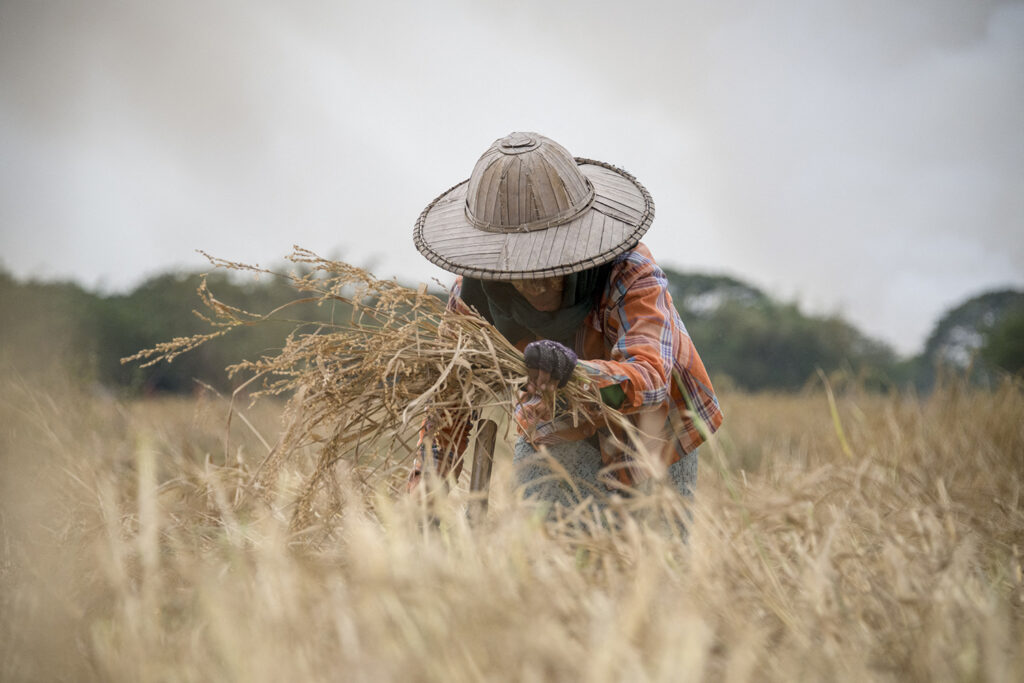
In Thabaung Township in Ayeyarwady, farmers from five village tracts were summoned by a group of junta officials – including a major in the army, the township administrator and MADB staff – and forced to sign agreements to repay loans by June.
“They threatened to take action if we didn’t pay, saying they would confiscate our Form 7 and put our land up for auction. So, the farmers had to look for new loans from outside sources to repay the bank,” U Nay Myo*, a Thabaung farmers’ representative, told Frontier.
MADB staff are also under increasing pressure from the cash-strapped regime to recuperate loans, but face threats from resistance forces at the same time.
An MADB source in Ayeyarwady told Frontier that during the bank’s 70th anniversary celebration, held at its headquarters in Yangon on June 1, directors gave awards to branches that collected repayments on time and in full.
Branches that have fallen behind in collecting debts, meanwhile, face pressure “from above”, said the source, who asked not to be named. “Headquarters complains to the regional chapters which complain to the district heads, and then down to the township branches.”
The MADB has also dismissed workers who joined the mass strike of public servants known as the Civil Disobedience Movement, while other staff have resigned out of fear of being targeted by armed resistance groups. In February, the Myaing Township branch in Magway Region was burned to the ground, and two months later, the Wakema Township branch in Ayeyarwady was bombed.
The Ayeyarwady Dolphin People’s Defence Force, one of the groups that carried out the bombing, said they targeted the bank because it had threatened to confiscate land from local farmers if they didn’t repay their loans.
“We want to warn the manager and staff of the bank, the ward administrators and everyone else that if they continue cooperating with the junta, we will take effective action again,” a spokesman for the resistance group told Frontier.
The threats and attacks seem to be having the intended effect, with some staffers saying they would rather resign than risk making ground visits.
One woman, who had worked for MADB for 12 years in Mandalay Region, told Frontier she resigned after she was ordered to check household lists in a village where her uncle, a junta supporter, had been assassinated.
“Just two weeks after my uncle was killed, [the manager] put my name down to visit villages and inspect household lists,” she said. “I asked the manager to reconsider, but she refused and said I had to quit if I didn’t want to do it. So, I quit.”
MADB in the red
There are growing signs that the bank is facing a crisis, both from a shortage of cash and personnel.
A township branch manager in Mandalay Region, who asked to comment anonymously, told Frontier that the regime’s Ministry of Finance and Planning had temporarily “merged” MADB with the Myanma Economic Bank. She said this “consolidation period” is a result of MADB’s cash shortage.
“They called it a merger of the two banks, but in reality, the MADB is now under the MEB,” she said.
The banks worked together before the coup, but under a different arrangement. The MADB would announce a nationwide loan figure, and the MEB would transfer the total amount to the MADB’s central branch. The MADB would then distribute the money to farmers through township branches and continue disbursing funds until the entire budget had been spent.
But now, the MEB has a tighter grip. Township MEB branches transfer funds to their MADB township counterparts, and when loans are repaid, the MADB must deposit the money with MEB on the same day.
“It feels like we’re servants of the MEB,” the township manager said. “It makes more work for MADB staff.”
The MADB source in Ayeyarwady Region said a lack of personnel makes the burden even heavier.
“So many staff are leaving, creating a labour shortage that adds to the workload of the remaining staff who don’t get a decent salary,” he said, referring to the basic monthly salary of K190,000.
Exact figures for how many workers have resigned or been sacked are not available, but in December last year the MADB advertised 200 vacancies across its township branches. RFA reported two months after the coup that the MADB’s Yangon head office had dismissed 60 staff for joining the CDM. The township manager in Mandalay Region said two of her eight team members have left since the coup and were never replaced.
Meanwhile, farmers say the loans the MADB does offer no longer cover the soaring costs of inputs like fertiliser, seeds and fuel. The bank issues loans of K150,000 per acre for the rainy season crop and K100,000 per acre for the winter crop, with a maximum of 10 acres per farmer.
Eight of the 12 farmers interviewed by Frontier said even if a loan were to become suddenly available for the rainy season crop, they wouldn’t bother taking because it would only cover one bag of fertiliser per acre.
Ko Myo Thant, a Maubin Township farmer in Ayeyarwady, said a bag cost about K30,000 before the coup. “Now one bag of fertiliser is around K140,000. We calculate the overall investment cost for one acre at over K300,000, so farmers don’t want the bank’s loans anymore,” he said, adding they also don’t want to deal with the “arrogant” bank staff.
‘All our labour is just for the loan company’
Ko Aung Tun, an associate fellow at the Singapore-based ISEAS-Yusof Ishak Institute who has published research on Myanmar agriculture, said farmers are being pushed to take out riskier loans from informal sources.
“I don’t think that any old business-as-usual system of loan mechanisms can work in this highly volatile environment. Now farmers are taking high interest loans from outside sources instead of through formal loan mechanisms, putting their investments at considerable risk,” Aung Tun told Frontier.
Ko Than Win Htun, a farmer in Danubyu, said some microfinance companies are stepping in, demanding land titles as collateral.
“We buy fertiliser on credit at private shops with a monthly interest of three percent. On top of that we need more money for other inputs. So, farmers are borrowing from the private sector,” he said.
Cash-strapped farmers are also cutting inputs as much as they can, for instance by halving the amount of fertiliser per acre, at the risk of lower rice yields.
“If the yield falls then all our labour in the fields is just for the loan company,” Than Win Htun said. “But we can’t miss loan repayments because they would seize our Form 7 and our land.”
Daw Mya Win, a farmer in Ayeyarwady’s Hinthada Township, said it’s quicker to get money from local loan sharks than the MADB. So, many people are now taking out informal loans first, then using their MADB loans to pay back their initial loans with interest. This risks creating a debt cycle.
“State-led intervention is required to remedy this crisis,” said Aung Tun. “But one thing is certain: farmers who don’t see the cost-benefit of their farm work will migrate elsewhere, as they have been doing.”
Than Win Htun says he can no longer make enough money from his farm to support his family, so they’ve had to take on extra work to make ends meet.
“My wife has opened a home-shop selling some groceries, and I breed chicken and pigs to make some money. If we only relied on farming, our family would starve. It’s not just our family. Most farmers in the villages are finding other ways to survive,” he said.
*denotes a pseudonym for security reasons


